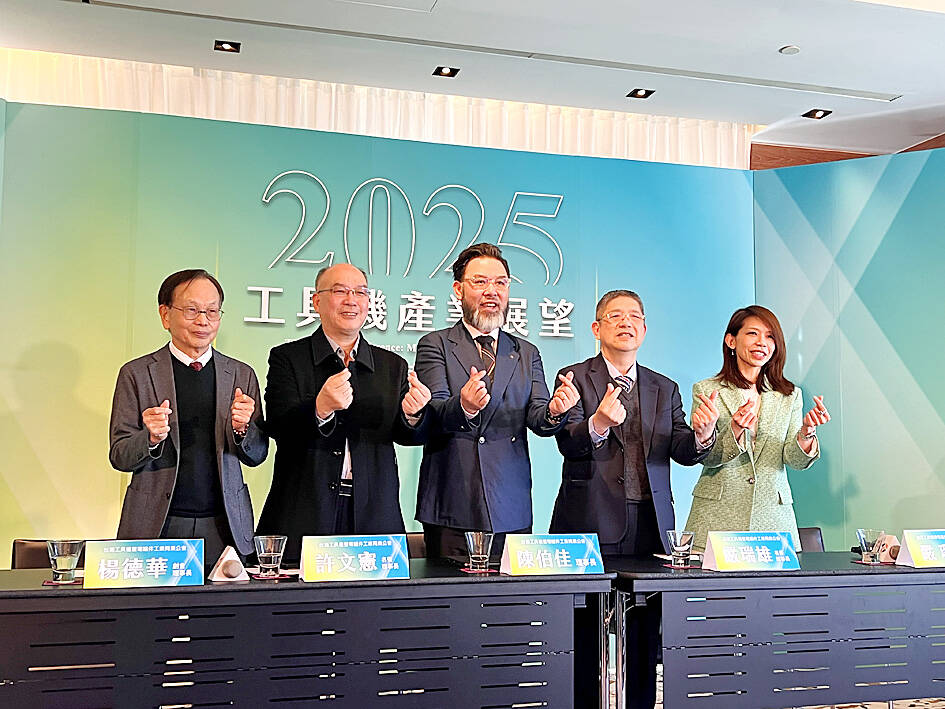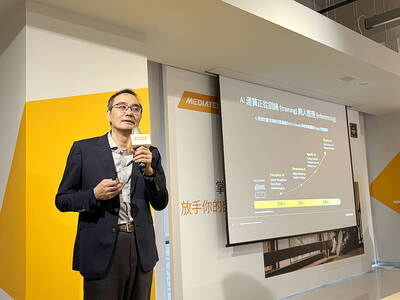Machine tool exports are expected to grow 5 to 10 percent this year, as the market gradually stabilized in the final quarter of last year and prospects became clearer, the Taiwan Machine Tool and Accessory Builders’ Association (TMBA, 台灣工具機暨零組件公會) said yesterday.
However, sentiment among its member companies is mixed, as many of them — especially components manufacturers — expect revenue to grow this year, but are cautious about the outlook for exports, the association said.
An internal survey by the association found that 50 percent of its members expect outbound shipments to grow this year, 27 percent project a decline and 23 percent forecast a flat performance, it added.

Photo: Lin Jin-hua, Taipei Times
“This indicates the industry is still facing challenges from the external environment,” association chairman Patrick Chen (陳伯佳) told a news conference in Taipei.
Challenges mainly stem from the trade policy of the incoming administration of US president-elect Donald Trump, which could reshape global economic order and accelerate the relocation and realignment of supply chains, Chen said.
Moreover, as Trump vowed during his presidential campaign that he would impose new tariffs on imported goods, Taiwan must pay close attention to this matter, as its trade surplus with the US remains high, which could become a factor in future trade negotiations, he said.
Meanwhile, countries’ imposition of carbon reduction measures and a declining birthrate worldwide have prompted the industry to speed up digitalization, high-efficiency and green development, he added.
“2024 is expected to be the bottom and we hope there would be a chance to turn things around in 2025,” he said.
Taiwan’s machine tool exports last year declined 14.8 percent year-on-year to US$2.22 billion, while shipments of machine tool components grew 1.2 percent to US$1.51 billion, association data showed.
By products, metal-cutting machine tool exports fell 16.8 to US$1.83 billion, machine centers slumped 24.5 percent to US$658.21 million, lathes dropped 18.1 percent to US$533.63 million and metal-forming machinery slid 3.7 percent to US$383.42 million, the data showed.
Outbound shipments to China, including Hong Kong — the nation’s main export market — fell 11.5 percent year-on-year to US$630.59 million, and those to the US, the second-largest market, dropped 9.7 percent to US$341.31 million, the data showed.
Shipments to Turkey, the third-largest, plummeted 33.6 percent to US$192.29 million, while those to India, the fourth-largest, rose 20.8 percent to US$145.87 million, the data showed.
Ranking from fifth to 10th were Vietnam, Thailand, Germany, the Netherlands, Japan and South Korea, with mixed performances in shipments, the data showed.
The association has high hopes for the Taiwan International Machine Tool Show, which is to take place at Taipei Nangang Exhibition Center from March 3 to 7.
The trade fair is to showcase the local industry’s achievements in digital transformation and sustainable development, and is expected to help domestic manufacturers secure orders and bolster their presence in the global market, it said.

MediaTek Inc (聯發科), the world’s biggest smartphone chip supplier, yesterday said it plans to double investment in data center-related technologies, including advanced packaging and high-speed interconnect technologies, to broaden the new business’ customer and service portfolios. The chip designer is redirecting its resources to data centers, mainly designing application-specific integrated circuits (ASIC) with artificial intelligence (AI) capabilities for cloud service providers. The data center business is forecast to lead growth in the next three years and become the company’s second-biggest revenue source, replacing chips used in smart devices, MediaTek president Joe Chen (陳冠州) told a media event in Taipei. “Three or four years

CHIP HANG-UP: Surging memorychip prices would deal a blow to smartphone sales this year, potentially hindering one of MediaTek’s biggest sources of revenue MediaTek Inc (聯發科), the world’s biggest smartphone chip designer, yesterday said its new artificial intelligence (AI) chips used in data centers are to account for 20 percent of its total revenue next year, as cloud service providers race to deploy AI infrastructure to meet voracious demand. MediaTek is believed to be developing tensor processing units for Google, which are used in AI applications. While it did not confirm such reports, MediaTek said its new application-specific IC (ASIC) business would be a new growth engine for the company. It again hiked its forecast for the addressable ASIC market to US$70 billion by 2028, compared

Until US President Donald Trump’s return a year ago, when the EU talked about cutting economic dependency on foreign powers — it was understood to mean China, but now Brussels has US tech in its sights. As Trump ramps up his threats — from strong-arming Europe on trade to pushing to seize Greenland — concern has grown that the unpredictable leader could, should he so wish, plunge the bloc into digital darkness. Since Trump’s Greenland climbdown, top officials have stepped up warnings that the EU is dangerously exposed to geopolitical shocks and must work toward strategic independence — in defense, energy and

Motorists ride past a mural along a street in Varanasi, India, yesterday.